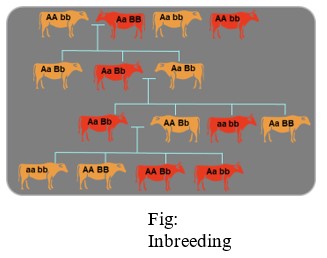Inbreeding depression can be overcome by
Inbreeding depression is the reduced biological fitness that has the potential to result from inbreeding the breeding of related individuals.
UC Berkeley. In a small population, matings between relatives are common. For example, a population of 40 adders Vipera berus , shown at right experienced inbreeding depression when farming activities in Sweden isolated them from other adder populations. Higher proportions of stillborn and deformed offspring were born in the isolated population than in the larger populations. When researchers introduced adders from other populations — an example of outbreeding — the isolated population recovered and produced a higher proportion of viable offspring. The explanation for inbreeding depression lies in the evolutionary history of the population. An individual carrying a single recessive deleterious allele will be healthy and can easily pass the deleterious allele into the next generation.
Inbreeding depression can be overcome by
Additional Information. Last updated on May 25, Get Started. English Hindi. This question was previously asked in. Attempt Online. Cross breeding Out breeding Out crossing Interspecific hybridization. Start Now. Concept: Inbreeding refers to the mating between closely related individuals within the same breed for 4 - 6 generations. Close inbreeding usually results in the reduction of fertility and productivity. This is called inbreeding depression.
Which of the following is NOT an organ?
.
Federal government websites often end in. The site is secure. Preview improvements coming to the PMC website in October Learn More or Try it out now. All data and results supporting this study are provided in the main text, Appendix A and Supplementary Materials. Inbreeding depression has been widely documented for livestock and other animal and plant populations. Inbreeding is generally expected to have a stronger unfavorable effect on fitness traits than on other traits.
Inbreeding depression can be overcome by
Inbreeding depression is the reduced biological fitness that has the potential to result from inbreeding the breeding of related individuals. Biological fitness refers to an organism's ability to survive and perpetuate its genetic material. Inbreeding depression is often the result of a population bottleneck. In general, the higher the genetic variation or gene pool within a breeding population, the less likely it is to suffer from inbreeding depression, though inbreeding and outbreeding depression can simultaneously occur. Inbreeding depression seems to be present in most groups of organisms, but varies across mating systems. Hermaphroditic species often exhibit lower degrees of inbreeding depression than outcrossing species, as repeated generations of selfing is thought to purge deleterious alleles from populations. For example, the outcrossing nematode roundworm Caenorhabditis remanei has been demonstrated to suffer severely from inbreeding depression, unlike its hermaphroditic relative C. Inbreeding i.
Google sesle kilit açma
Trusted by 5. Second, most offspring will have some deleterious traits, so few will be more fit for survival than the others. An individual carrying a single recessive deleterious allele will be healthy and can easily pass the deleterious allele into the next generation. Interspecific hybridization: It refers to the crossing between male and female animals of two different species. The disease caused by breathing polluted air is:. Many angiosperms flowering plants can self-fertilise for several generations and suffer little from inbreeding depression. In general, the higher the genetic variation or gene pool within a breeding population, the less likely it is to suffer from inbreeding depression, though inbreeding and outbreeding depression can simultaneously occur. But if the northern hairy-nosed wombat suffers from inbreeding depression, there are no other populations that can rescue it. Learn now! More Biology Questions Q1. Science Daily. Biological fitness refers to an organism's ability to survive and perpetuate its genetic material. Malden, MA: Blackwell Pub. This normally has a positive effect, as most genes are undergoing purifying selection the homozygous state is favored. Backward evolution Genetic diversity Heterosis outbreeding enhancement Insular dwarfism Island gigantism Minimum viable population Outbreeding depression Population genetics Rescue effect Royal intermarriage Vadoma Autogamy depression.
UC Berkeley. The offspring resulting from inbreeding tend to have health problems and lower reproductive success. This is known as inbreeding depression.
This question was previously asked in. Cross breeding Out breeding Out crossing Interspecific hybridization. Although naturally occurring, purging can be important for population survival, deliberately attempting to purge deleterious mutations from a population is not generally recommended as a technique to improve the fitness of captive bred animals. Contents move to sidebar hide. What is the phylum of Octopus? PMC Third, recessive deleterious alleles will be "masked" by heterozygosity, and so in a dominant-recessive trait, heterozygotes will not be selected against. Haldane Sewall Wright. Tools Tools. Wikimedia Commons. This can lead to reduced fitness of a population with many homozygous genotypes, even if they are not deleterious or recessive. The offspring is known as an out-cross. In other projects. Interspecific hybridization: It refers to the crossing between male and female animals of two different species.


Absolutely with you it agree. In it something is also idea excellent, agree with you.